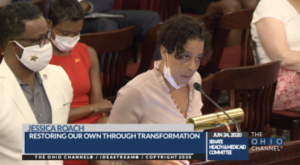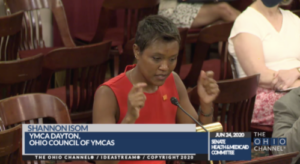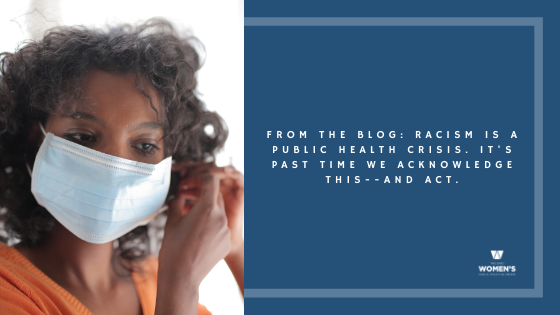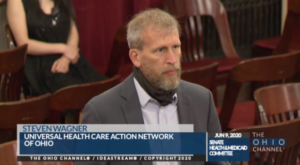Racism Is a Public Health Crisis. It’s Past Time We Acknowledge This — and Act.
Monday, June 15th, 2020
Racism Is a Public Health Crisis. It’s Past Time We Acknowledge This — and Act.
Updated: July 6, 2020
In the midst of the global coronavirus pandemic, which is disproportionately devastating Black communities, our nation is beginning to confront another health crisis that has long threatened the health and lives of Black people and people of color: racism. From health care to housing, from policing to economic opportunity, systemic racism is embedded into our country’s institutions, public policies, and even its founding.
As a direct result of our nation’s racist systems and policies, the health and economic fallouts of the coronavirus crisis are hitting people of color the hardest: Black people are overrepresented in both the COVID-19 case counts and hospitalizations, in Ohio and nationally. Women of color make up the majority of the “essential” frontlines workers, putting their health and lives on the line to provide for themselves and their families. At the same time, Black and Latinx women have experienced the highest rates of unemployment, both when the crisis first hit, and now, as state economics begin to reopen.
COVID-19 has laid bare the ways in which racism impacts the health and livelihood of communities of color, prompting a call for our state and national leaders to address the crisis through a racial lens. The protests following the murders of George Floyd, Breonna Taylor, Ahmaud Arbery, Tony McDade, and countless other Black people at the hands of police and racist attacks have amplified these calls for accountability and change to racist policies, not only in policing, but across the board within our health, economic, and criminal justice systems.
Now, those with power and privilege cannot look away as a groundswell of voices calls for our state to acknowledge the dangerous health impacts of racism, and to meet this threat with action. State lawmakers – spearheaded by members of the Ohio Legislative Black Caucus – introduced joint resolutions in the House and Senate (Senate Concurrent Resolution 14 and House Concurrent Resolution 31), which would take an important step forward in these efforts by formally declaring racism a public health crisis and spurring continued action by our state to promote racial equity.
Many local governments in Ohio and across the nation have passed similar declarations, and Ohio is one of a handful of states that are considering such resolutions. Over the last few weeks, the Senate Health, Human Services, and Medicaid Committee held two hearings on Senate Resolution 14, providing an opportunity for the bill sponsors and proponents of the bill to give testimony.
The Women’s Public Policy Network, along with several of our coalition partners, including Equality Ohio, Equitas Health, the Ohio Alliance to End Sexual Violence, the Ohio Chapter of the National Social Workers, the Ohio Federation of Teachers, Policy Matters Ohio, Restoring Our Own Through Transformation (ROOTT), UHCAN Ohio, URGE: United for Gender and Reproductive Equity, and YWCA Dayton provided written or in-person testimony in support of the resolution, joining the hundreds of individuals and organizations who submitted proponent testimony over two days of hearings. (Below, we highlight partner testimony from the hearings).
During the hearings, many witnesses called out the fact that historically, our country’s laws and policies have reinforced and perpetuated structural and institutional racism, discrimination, and bias towards people of color. Still today, many of the policies currently in place continue to perpetuate racial disparities in access to quality health care, workplace protections, economic opportunity, and freedom from violence. Our state lawmakers can actively dismantle these systems of oppression and racial injustice by advancing truly anti-racist policy solutions.
“Police violence is only one manifestation of racism as a public health crisis. Underlying these gruesome, widely shared videos are centuries of public policy that have created racial disparities either intentionally or by neglect in health care, housing, human services and on. Social workers see these impacts in every facet of health and human services where we work; as the predominate providers of behavioral healthcare in the state, in child and adult protection, doctor’s office and hospitals, schools, prisons and nursing homes. In each of these areas of practice, racial disparities in outcomes are common, not because of factors internal to Black people and other people of color, but because of racism in the environment.” Colleen Dempsey, Licensed Independent Social Worker and the Practice Associate for the Ohio Chapter of the National Association of Social Workers (Watch Colleen’s testimony)

“While the focus is now on the criminal justice system, which needs to be fixed, we also need to understand that the problem extends well beyond criminal justice and, in fact, seeps into every aspect of the work we do in Ohio. To end racist policies, we must, as this resolution demands, look at every codified ordinance through a racial equity lens.” Melissa Cropper, President, Ohio Federation of Teachers (Watch Melissa’s testimony)
Racism and racial bias is embedded into the systems that shape health outcomes across a person’s lifetime, including the health care systems where people seek care and services. We can look to our nation’s racial disparities in maternal mortality and morbidity rates as one of the many ways that racism within health care has very dangerous, deadly consequences for Black women and women of color. Black women are three to four times more likely to die from pregnancy-related deaths compared to white women, not solely because of racial disparities in access to and quality of care, but primarily as a result of discrimination and implicit bias in the health care system experienced before, during, and after pregnancy and stress and trauma associated with structural and institutional racism. A number of witnesses – many within the health care or medical industry – explained the ways in which our society has pointed to the “social determinants” of health as the core reason for racial health disparities, rather than focusing on the root cause: racism.

“[At ROOTT], we DO NOT focus merely on the social determinants that have become popular and safe to discuss publicly. We understand that the structural determinants of health and public policy steeped in racist ideologies have created the consequences we now call social determinants. As an organization, we have been intentional in proclaiming that racism is a public health risk factor, not one’s racial or ethnic designation…We are clear that race neutral solutions will not correct race specific challenges. Given the disproportionate impact of infant and maternal mortality on Black families, that occurs for a variety of institutional and systemic reasons that directly correlate with racism in the form of violent community policing, it is counterintuitive to expect solutions that ignore this unique specificity to be effective. ” Jessica Roach, CEO and Founder, Restoring Our Own Through Transformation (ROOTT) (Watch Jessica’s testimony)

“Hundreds of years of slavery, racism, and discrimination in this country have compounded to deliver poor health and economic outcomes for black people — heart disease, diabetes, and poverty— that are being magnified under the lens of the current coronavirus pandemic. This legacy of racism has also led communities of color to have less trust in institutions like the public health system, leading to even poorer health outcomes… Because our nation’s legacy of discrimination and preserved structural racism perpetuates racial disparities, actions must be targeted to address the specific needs of communities of color as we fight for better health outcomes.” Shannon Isom, Executive Director, YWCA Dayton, and President, Ohio Council of YWCAs (Watch Shannon’s testimony)
In addition to declaring racism a public health crisis, Senate Resolution 14 outlines steps for concrete action, such as urging the governor to establishment of a working group to promote racial equity and adopting a “racial equity lens” in legislative work within the state legislature. These components of the legislation could create opportunities for our state lawmakers to move forward policy solutions during COVID-19 and beyond that center the experiences and needs of people of color by actively applying a racial lens to proposals. As many of the witnesses mention, our public policies must be actively anti-racist to address the root causes of racial inequality.

In anti-sexual violence specifically, racism is a threat to the work of those who serve survivors in rape crisis centers. Survivors of rape, their families, and our communities cannot get the justice we call for when the justice system was created to oppress. Much less can they receive healing or any sense of safety as they navigate through their traumatic experiences if we are unable to call things as they are and if we refuse to create spaces that are truly culturally sensitive and genuine for people of color to receive what they need. To dismantle anti-Black racism and oppression in all its forms, change must take place from government offices, to state agencies, to non-profit programs, education institutions and the for-profit sector.” Rosa Beltré, Executive Director, The Ohio Alliance to End Sexual Violence (Watch Rosa’s testimony)
“Good decisions and good policy are driven by data. Yet decisions are frequently made without information on how policy will differentially impact people of color. All decision makers who are privileged should come to an understanding of their privilege, the role of implicit bias and the systems that reinforce racism.” Steven Wagner, Executive Director of the Universal Health Care Action Network of Ohio (UHCAN Ohio) (Watch Steve’s testimony)
“During the COVID-19 pandemic, we are only as safe as the person closest to us, and our health is connected to the health of our neighbors and our community. With Black Ohioans getting sick at higher rates, the COVID-19 pandemic is shining a light on what has always been true: Public policy choices, for years, have denied Black and Brown Ohioans the care and treatment we all deserve…This resolution should be passed, but the state cannot rest on its laurels. The resolution must be supported with urgent action.” Jasmine Ayres, Policy Liason, Policy Matters Ohio (Watch Jasmine’s testimony)
“By adopting this resolution, Ohio can lead the nation in these efforts to uproot racism from our structures and systems, and begin to work to provide just, equitable solutions to some of the biggest problems facing Black Ohioans and Ohioans of color. While this resolution would be an important step in the right direction, there is a long way to go. There are a number of anti-racist policy proposals currently pending in the State Legislature: establishing a living wage, enacting statewide paid family and medical leave program, and addressing racial disparities in maternal mortality and morbidity.” Erin Ryan, Managing Director, The Ohio Women’s Public Policy Network (read Erin’s testimony)
The Senate Health Committee chair announced during one of the hearing that there would be future opportunities to provide statements and testimony on Senate Resolution 14. To stay up-to-date about the progress on these and other legislative proposals, sign up for our weekly newsletters where we share updates on what’s happening in the Ohio Statehouse and how to take action.

Here’s how you can take action today:
Join us in support of the proposal for state lawmakers to declare racism a public health crisis in Ohio by sending a letter to your lawmakers, using the letter-writing campaign from our partners at Innovation Ohio.
Ohioans want our government officials to listen to doctors and public health experts. And the American Academy of Pediatrics, American Medical Association and American College of Physicians all agree: racism is a public health crisis.



